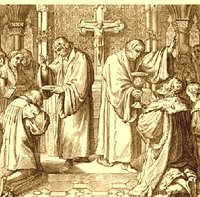Admission to the Altar
Q: What are the prerequisites for receiving Holy Communion?
 A: Different church bodies have varying criteria for receiving the Lord’s Supper. In general two extremes exist, either all (or all adults) in attendance are welcomed or else some form of instruction and examination is practiced and only those who undergo these are admitted to the altar. Within these extremes, we find immense variety of theology and practice.
A: Different church bodies have varying criteria for receiving the Lord’s Supper. In general two extremes exist, either all (or all adults) in attendance are welcomed or else some form of instruction and examination is practiced and only those who undergo these are admitted to the altar. Within these extremes, we find immense variety of theology and practice.Since there are so many variations, I’ll outline only the classical Lutheran position, which follows in main the traditional practice of western Christendom. The whole of Christian education, particularly the teaching of those preparing for either Baptism or admission to the Lord’s Supper, is called catechesis.
Taken from a Greek expression involving teaching by word of mouth, catechesis normally involves some form of question and answer or extended dialogue format, often including memorization of chief points of doctrine. Its purpose is to summarize Christian beliefs and then lead the catechumens (or students) to take the teaching to heart, that they would hold the same confession of faith as does the body of believers.
We generally say that a person should be “examined and absolved.” This comes from Paul’s admonition in 1 Corinthians 11:28-29: “Let a person examine himself, then, and so eat of the bread and drink of the cup. For anyone who eats and drinks without discerning the body eats and drinks judgment on himself.” Catechesis opens us to examination by our pastors and then teaches us how to examine ourselves and how to examine and understand God’s Word and the Lord’s Supper.
Self-examination should lead Christians to a twofold confession — a confession of sins and a confession of faith. When we look at ourselves in the light of God’s Word, we realize that we are fallen sinners who deserve God’s wrath. Yet we also know that God forgives us for Christ’s sake and we trust that in the Supper we receive what Christ says we receive, that is, His body and His blood.
 The catechetical period teaches the Faith in such a way that people learn to examine both themselves and what they will be eating, thus approaching the altar knowing what they receive and how it is of great benefit. When such is the practice, normally only those who have been instructed in the same teachings are invited to commune and a common (communal) confession of faith precedes joining the communal eating and drinking.
The catechetical period teaches the Faith in such a way that people learn to examine both themselves and what they will be eating, thus approaching the altar knowing what they receive and how it is of great benefit. When such is the practice, normally only those who have been instructed in the same teachings are invited to commune and a common (communal) confession of faith precedes joining the communal eating and drinking.The confession of sins may be in a corporate setting, often preceding the worship service. It may also be done individually, either on the same day or at an earlier time. When sin is confessed, we admit the need for salvation. When the Triune God is rightly confessed, we state that Christ Jesus is our Salvation. When we hear the Absolution, we hear Christ speaking His saving Word through His called pastors. When we know Him as our Salvation, we cling to His every word and trust Him when He tells us that it is His very body and blood offered us to eat and drink.
Sometimes this approach is called “closed Communion,” since reception is closed to those holding a different confession than do the communicants. The other extreme is usually called “open Communion,” because it’s open to all (or at least all those baptized) who are present. Some play a semantic game and speak of “close Communion” — meaning to imply that those who are “close enough” in belief may join. However, this begs the question, “How close is ‘close enough’?”
Scripture quoted from The Holy Bible, English Standard Version™, © 2001 by Crossway Bibles.
Send email to Ask the Pastor.
Walter Snyder is the pastor of Holy Cross Lutheran Church, Emma, Missouri and coauthor of the book What Do Lutherans Believe.
Technorati Tags: Holy Communion | Lord’s Supper | Sacrament of the Altar | Eucharist | Lutheran | confessional Lutheran | Confession and Absolution | Law and Gospel | closed Communion | open Communion | close Communion | pastor | catechesis | catechumen | doctrine | teaching | faith

0 Comments:
Post a Comment
<< Home